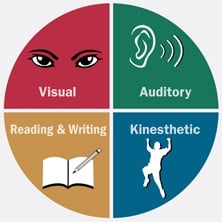Taking your grade from average to excellent is mostly achieved by doing a small number of simple, easy to implement things consistently. Are you ready to learn what some of those things are? In the previous article we looked at 5 secret study habits to boost your grades to the next level. Today we’re going to learn about 5 more!
Let’s get started!
1. Use “Chunking” & Summary Cards
Most complex subjects can be broken down into smaller categories and distilled down to key points. The process of breaking down a complex subject or piece of information into smaller, easier to understand pieces is called chunking. We can then create bullet points or mini summaries on post cards and remember/revise these bullet points for exam day.
For example, when studying the key figures in World War II for a history exam we could create one card for each major character or event and write down some key information, dates and essential things about that person or event. This would make it much easier to remember and recall this information later due to the fact we have broken it down and organized it into categories.
Philosophers of mind as far back as Aristotle have said that humans essentially think in categories and sort all information we come across into these groups. Use that natural human tendency to your advantage by creating summary cards!
Writing the information down on separate cards helps us to remember which information is associated with which subject, too. Pretty simple, right? Yet you will be amazed how effective this technique is.
2. Create a Schedule & Reward Yourself
The toughest thing about studying is that nobody is there to push you and make you do it. It’s something we have to summon our own self-discipline to achieve.
This is why creating a schedule works. You’ll probably already know what time of the day or evening you feel most awake and alert. This is the best time to schedule in an hour or two of study. Everyone has their own individual “best time” to study, so do what works for you. After all you know yourself best!
When you do stick to your study schedule for a whole week, reward yourself with something you have wanted. It can be a small purchase, a trip to the bakery for a slice of delicious chocolate cake or anything you desire.
Just make sure you don’t cheat. Your brain constantly learns to associate the pleasure response with certain stimuli and if you cheat it will create a pattern of shortcuts to rewards and will reinforce bad habits.
Likewise if you have the commitment and discipline to reward yourself after a great study session or a whole week of sticking to your routine your brain will learn that work comes before play and you will be building habits that carry you to excellence and success.
If you need to, find an accountability partner to make sure that you don’t cheat!
3. Location, Location, Location!
We’ve already said that the simplest things can make a huge difference in your studies. The location you pick is no exception. In fact, it is absolutely essential that you pick a suitable study area.
We live in a world where there are one thousands things competing for our attention at all times. Friends are messaging us, the TV is tempting us to just watch one more great episode of our favourite show… there are noises, movements and other distractions virtually everywhere.
Our attention, however, is limited. Think of it like the beam of a flashlight on a dark night. When point west we cannot see what is east and when pointing east we cannot see what is west. We need to focus our attention and in order to do that we have to pick somewhere that has minimal distractions.
The ideal study environment will be quiet, easily accessible and will not have many distractions to tempt you away. A library, a quiet coffee-house away from the roadside or even a spare room in your home will be ideal.
Try to use the same place to study as often as you can and do not engage in any other activity while in that area. Again through the power of association your brain will begin to learn that when you enter this location you study and this will help you shift into the right frame of mind when you enter this area in the future.
Are you beginning to understand how your brain learns habits and how you can deliberately create positive, self-reinforcing ones? Good! Let’s proceed.
4. Discover Your Learning Style
Did you know that every individual student has a preferred learning style?
It is broadly accepted by education researchers that there are three main styles of learning – visual, auditory and kinesthetic. Everyone can learn in all three ways but each individual will have a stronger style and a weaker style. You will know which style you are by trying to recall a piece of information which you learned last week. Imagine now that you are going to share this information with a friend.
Did you see an image? Then you are a visual learner. Did you hear someone tell you the information? Then you are probably an auditory learner. Did you feel the need to carry out some form of movement or physically demonstrate something to explain the piece of information? Then in all probability you are a kinesthetic learner.
Fascinating, isn’t it? Believe it or not discovering which style best suits you can have a massive impact on how quickly and effectively you learn. Luckily in today’s world, as we mentioned in the previous study habits article, there are many resources online which you can use to study.
If you are auditory, listen to a lecture. If you are visual, reading will really help or a video can greatly aid you. If you are kinesthetic, watch a how-to video or try to move around as you learn.
Of course you will probably have to use all three styles of learning at some point but you can focus on your strong style most to make the most of your study time.
5. Manage Your State
World class self-development coach and best-selling author Tony Robbins has spent a lifetime teaching people how to manage and change their “state”.
State is really just short for state of mind. You can mostly put the various states of mind you feel into two categories: positive and negative. You want to try your best to stay in the positive states of mind as these maximize your chances of success.When faced with a mountain of books to revise it is normal to feel anxious or de-motivated. When coming up to exam day it is normal to feel worried or nervous. However, did you know it is possible to take charge of and actively change your state of mind?
Try telling yourself positive things like “This is under my control, I can choose to make the best or the worst of it” or “I know I can learn anything if I put my mind to it”. These positive mantras will put you into a motivated state of mind where you feel in control of your own destiny. This will melt away worry and anxiety.
If you prefer you can listen to an upbeat song while closing your eyes and imagining a positive outcome. You can imagine getting your exam results and opening the letter to see an A. You can imagine how proud your parents will be. You can imagine being accepted to your chosen university or getting your dream job in the future.
These positive mental techniques will help you shift out of negative, sluggish, de-motivated and worrisome states of mind and flip you into positive, energized, motivated and confident states instead.
If you need more evidence that this works you can try it for yourself. In the meantime consider that CEO’s, high-powered officials and even the president of the USA have used these techniques and hired Tony Robbins as a mentor to help them through tough times and decisions!
If these techniques can help presidents make life and death decisions, they can sure help you to boost your grade! Wouldn’t you say?
A Final Question…
This concludes our two-part series on study habits, tips and tricks you can use to boost your grade. You now have ten powerful tips and techniques at your disposal which you can use to take your studies to the next level.
The only decision left to make is one which is entirely up to you: Are you willing to use them?






